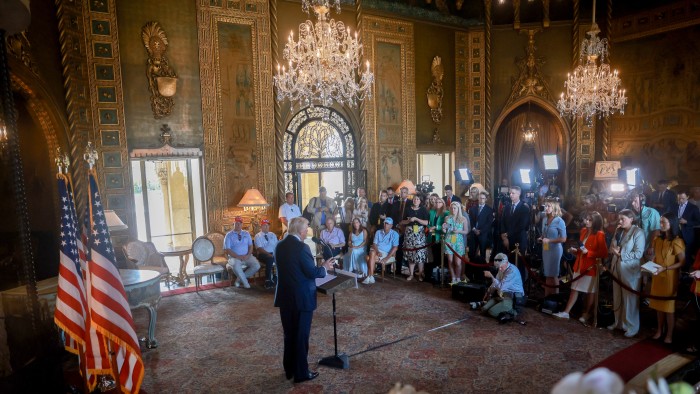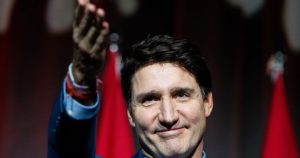Always follow the money with Trump

This article is an on-site version of our Swamp Notes newsletter. Premium subscribers can sign up here to get the newsletter delivered every Monday and Friday. Standard subscribers can upgrade to Premium here, or explore all FT newsletters
The F-word came back into everyday currency when Donald Trump first became a candidate. The late Madeleine Albright’s 2018 book, Fascism: A Warning, set the tone early in Trump’s first term. But it has been given new life by the darker implications of Trump’s impending second one. A cottage industry of fascist-alert academics — of whom Yale’s Timothy Snyder is, in my view, among the most penetrating — has come into being. Some call them the “resistance historians”. I have no objections to scholars using history to shed light on today’s political dangers — and I mostly agree with their arguments. But I have misgivings about how effective they are.
Kamala Harris, like Hillary Clinton, premised her campaign on an Albrightesque warning. The electorate yawned. The fact that Trump has once before been president without the sky falling played a part. Former British prime minister Harold Wilson was famously accused of “stirring up apathy”. As I listened to Harris’s warnings of what a Trump victory would mean, I was occasionally reminded of that quote.
This is not a critique of Harris’s case; in these conditions, I doubt Bill Clinton or Barack Obama would have had much better luck. But her campaign phrase “we’re not going back,” raised more questions than it answered. Either we had or we hadn’t already experienced fascism. She seemed to be arguing it both ways.
This note is based on the cry wolf fable. If we keep predicting the worst-case scenarios and they don’t arrive, people will become inured to the slightly less worse ones. The key to that allegory is that when the boy finally sighted the wolf he had lost credibility.
Trump tried many outrageous things in his first term and was largely blocked. These included orders to shoot Americans in cold blood. His presidency also featured PT Barnum-like antics about crowd sizes and hurricane trajectories. He could hijack half the media’s mindshare for 24 hours with a comical misspelling or a crude aside. He was both a figure of fun and an aspiring Voldemort. This time Trump will have many more death eaters around him. I hope the media has also evolved since then. If it continues to treat Trump’s uncouth mannerisms as the story, Americans will reach for even stronger noise cancelling headphones.
The most pressing job is to find out what is actually happening. Postmodern fascism may well be in our future but a new oligarchy is taking shape beneath our noses. Trump has appointed a team of billionaires — more than half a dozen and counting — that is instantly redolent of Dwight D. Eisenhower’s cabinet of eight millionaires and a plumber. But those were different times. Ike was not surrounded by grifters accused of charging tens of thousands of dollars in monthly retainers to secure introductions to his inner circle and monetise its gossip. Trump’s court in Mar-a-Lago is less an administration-in-waiting than a casino where the currency is access and visibility. The sultan is susceptible to praise and flattery.
His mini-me Elon Musk is both the richest man in the world and overlord of a plan to overhaul the US federal government. That most of his companies are under investigation by one DC regulatory agency or another is a giant conflict of interest. That he will be overseeing reform of the Pentagon with which his company Starlink has billions of dollars in contracts, is potentially a question of national security. Without having been elected to anything or confirmed in his role by the US legislature, Musk will be wielding huge sway over America’s future. The chances that he will become history’s first trillionaire — with its interstellar baronial implications — may be less scary than fascism. But it is taking shape in front of us.
Around the court’s favourites are ever-widening rings of donors, hustlers, lobbyists, sycophants, and felons. Lots of felons. Some ex-convicts are making it into high office — Charles Kushner will be US ambassador to France; Peter Navarro will be a senior White House adviser.
Almost all of Trump’s loyalists are part of his merchandise-quackery empire. Kash Patel, the proposed next FBI director, has been writing children’s books about Trump. In the first, The Plot Against the King that has a wizard called Kash who saves King Donald from “Hillary Queenton” and proves the king did not collude with the “Russonians”. I could devote a note to Patel’s amateurish sycophancy. But America’s proposed chief policeman is also a snake oil salesman. Among other business ventures, he has helped sell pills that promise to reverse the allegedly damaging effects of the Covid-19 vaccine. Patel is also an intended sword of Trump’s retribution, which has genuinely fascist overtones. But we should never lose sight of the money.
The Palm Beach cirque du soleil will soon move to Washington DC. Rahm Emanuel, the outgoing US ambassador to Japan, and former mayor of Chicago, this week said, “Donald Trump is going to turn the Oval Office into eBay. He is going to sell it to every special interest, and you’re going to be left paying that tab.” I think that’s about right. My advice to my media friends, and a reminder to myself, is to sift the merely outrageous from the genuinely corrupt and dangerous.
I am turning this week to my old friend and longtime Washington political commentator, prolific author and now media owner David Rothkopf. I regularly appear on David’s excellent Deep State Radio podcast. David, you’ve seen many administrations come and go and you have also witnessed revolutionary technological changes in the nature of America’s media. Given that Musk owns arguably the largest medium, X, and is using it as a tool of his political ascent, what advice would you have for the so-called legacy media?
Recommended reading
-
My column this week took issue with Joe Biden’s pardon of his son, Hunter — “Biden’s selfish parting act”: “Trump’s greatest skill as a politician is to tap into people’s cynicism,” I write. “Rather than upholding American ideals, he appeals to those who see them as a hypocritical sham. In that quest, he owes his opponents thanks, not persecution.”
-
My colleagues Anna Gross, Hannah Murphy and Stephen Morris wrote an instructive Big Read on why Elon Musk seems to have it in for Britain — and how former prime ministers, including Tony Blair and Boris Johnson, have been sidling up to him. Musk — who is rumoured to be considering a $100mn donation to Nigel Farage’s Reform Party, according to The Sunday Times — is reaching into democracies everywhere while remaining resolutely uncritical of China.
-
Finally do read Gideon Rachman’s sobering Lunch with the FT with Ukraine’s recently-departed foreign minister, Dmytro Kuleba. If the war continues on its current trajectory, Ukraine will lose, he says.
David Rothkopf responds
Ed, I wholeheartedly endorse the idea that we avoid catastrophism with regard to Trump. First of all, it is not good for the digestion. Secondly, as we saw during Trump’s first term, he has many terrible ideas but he and those around him are often so oblivious to the practical or political impediments that their worst intentions are not realised. Think “getting Mexicans to pay for a wall” or “Muslim ban”.
While Trump and company believe they have thought through ways to circumvent the guardrails that impeded them last time, they have not. You mention Musk. He has said he wants to cut the budget by $2tn dollars. That would not only trigger a depression and require the elimination of essentially all discretionary spending, with deep cuts to entitlements or defence spending, it would disproportionately hurt Republican districts. This will produce pushback — programme by programme — in a Congress where the GOP margins are razor thin. It, like rounding up 10mn immigrants, won’t happen because it can’t — and because many presumed Trump allies in Congress and the business world would actively oppose it.
That said, let me offer two areas where I take exception. One is your reference to the electorate yawning in response to Kamala Harris’s message. That just didn’t happen. In the shortest campaign in modern history, Harris very nearly won despite very strong headwinds against President Biden’s popularity and resistance to incumbents in many elections worldwide. The margin by which Trump edged her out was one of the lowest in history.
Finally, as you know, whether the electorate responds to a warning does not necessarily reflect on the validity of the message. While I agree it is politically wise to focus on what Trump is actually likely to get done, identify the biggest risks and then zero in on assembling the best coalitions to defuse those threats, we should not ignore the worst-case scenarios. Trump’s nominations and pronouncements already show a disregard for norms, a desire to prioritise loyalty over competence, and an impulse to seek revenge against perceived enemies. These are all characteristics of authoritarian leaders and Trump has repeatedly shown his fondness for strongmen and his disregard for the US Constitution and the rule of law. Further, as you point out, with Trump’s billionaire inner circle we are seeing what could be the next phase in a consolidation of power among some of America’s richest citizens — one that has already seriously weakened US democracy. That is likely to get worse.
So, while you describe a sound tactical approach to dealing with Trump, I think we should not too casually dismiss the well-above non-zero possibility that he does real damage to the institutions of our government and further disenfranchises many Americans including, ironically, many of those who supported his election in November.
Your feedback
We’d love to hear from you. You can email the team on [email protected], contact Ed on [email protected] or follow him on X at @EdwardGLuce. We may feature an excerpt of your response in the next newsletter
Recommended newsletters for you
Trade Secrets — A must-read on the changing face of international trade and globalisation. Sign up here
Unhedged — Robert Armstrong dissects the most important market trends and discusses how Wall Street’s best minds respond to them. Sign up here
#follow #money #Trump




